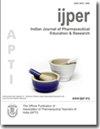青蒿素A类黄酮抑制人胃癌细胞增殖并诱导细胞凋亡
IF 0.8
4区 医学
Q3 EDUCATION, SCIENTIFIC DISCIPLINES
Indian Journal of Pharmaceutical Education and Research
Pub Date : 2023-10-04
DOI:10.5530/ijper.57.4.139
引用次数: 0
摘要
摘要背景:胃癌是世界范围内最常见的肿瘤复发类型之一。即使在治疗方法和早期发现方面取得进展,也未能显著降低与胃癌相关的死亡率和发病率。由于天然产物具有多种健康益处,明显没有毒副作用,以及化疗药物的局限性,近年来,以预防癌症为目的的天然产物引起了人们的极大兴趣。目的:一种被称为青蒿素的类黄酮植物化学物质已被发现存在于许多药用植物中。抗菌、抗氧化、抗炎、保护肝脏和心脏的作用只是其众多药理作用中的一小部分。材料与方法:本研究在AGS细胞系中评价了青蒿素作为胃癌抗癌药物的潜力。研究了青蒿素对细胞活力、凋亡诱导、线粒体atp酶活性、ROS生成和细胞周期进程的影响。实验选用顺铂作为阳性对照。结果:青蒿素对细胞活力的影响显示其细胞毒性电位呈剂量依赖性增加,并选择IC50浓度进行进一步实验。结果表明,青蒿素通过触发ROS通路和DNA损伤诱导AGS细胞凋亡。随着青蒿素浓度的增加,AGS细胞活力降低。结论:Artemtin对细胞的细胞毒作用可能是通过诱导细胞凋亡来实现的,这一机制得到了ROS和线粒体atp酶水平的显著提高以及AO/EB染色结果的支持。这些结果表明,青蒿素可作为一种有效的抗胃癌药物。关键词:胃癌,青蒿素,AGS细胞,活性氧,凋亡本文章由计算机程序翻译,如有差异,请以英文原文为准。
Artemetin, A Dietary Flavonoid Inhibits the Proliferation and Induces Apoptosis in Human Gastric Carcinoma (AGS) Cells
Abstract: Background: One of the most common types of recurrent carcinoma cases worldwide is gastric cancer. Even advances in treatment methods and early discoveries have not been able to significantly lower the death and morbidity rates associated with gastric cancer. On account of their multiple health benefits, apparent lack of toxicity and side effects, and the limitations of chemotherapeutic drugs, natural products have attracted a lot of interest in recent years with the aim of preventing cancer. Aim: A flavonoid class phytochemical known as Artemetin, has been discovered to be present in numerous medicinal plants. Anti-bacterial, antioxidant, and anti-inflammatory, hepatoprotective and cardioprotective actions are only a few of its many pharmacological effects. Materials and Methods: In the current investigation, the potential of Artemetin as an anticancer agent for gastric cancer was evaluated in AGS cell lines. The influence of Artemetin on the cell viability, apoptotic induction, mitochondrial ATPase activity, ROS generation, and cell cycle progression has been examined. Cisplatin was selected as the positive control for the experiments. Results: The impact of Artemetin on the cell viability revealed that its cytotoxic potential increased in a dose-dependent pattern and IC50 concentrations were chosen for further experiments. The results showed that apoptosis was induced by Artemetin in AGS cells by triggering ROS pathway and DNA damage. The cell viability of AGS cells was reduced with increased concentration of Artemetin. Conclusion: Artemtin's cytotoxic potential in cells is mediated by inducing apoptosis, which is supported by significant levels of ROS and mitochondrial ATPase as well as the findings of the AO/EB staining. All these results suggest that Artemetin can be used as a potent anticancer drug for human gastric carcinoma. Keywords: Gastric cancer, Artemetin, AGS cells, Reactive oxygen species, Apoptosis.
求助全文
通过发布文献求助,成功后即可免费获取论文全文。
去求助
来源期刊
CiteScore
1.40
自引率
0.00%
发文量
227
审稿时长
>12 weeks
期刊介绍:
The official journal of Association of Pharmaceutical Teachers of India (APTI) and is being published since 1967. IJPER, a quarterly publication devoted to publish reviews and research articles in pharmacy and the related disciplines of Pharmaceutical education. It mainly covers the articles of special interest, covering the areas of Pharmaceutical research, teaching and learning, laboratory innovations, education technology, curriculum design, examination reforms, training and other related issues. It encourages debates and discussions on the issues of vital importance to Pharmaceutical education and research. The goal of the journal is to provide the quality publications and publish most important research and review articles in the field of drug development and pharmaceutical education. It is circulated and referred by more than 6000 teachers, 40,000 students and over 1000 professionals working in Pharmaceutical industries, Regulatory departments, hospitals etc.

 求助内容:
求助内容: 应助结果提醒方式:
应助结果提醒方式:


